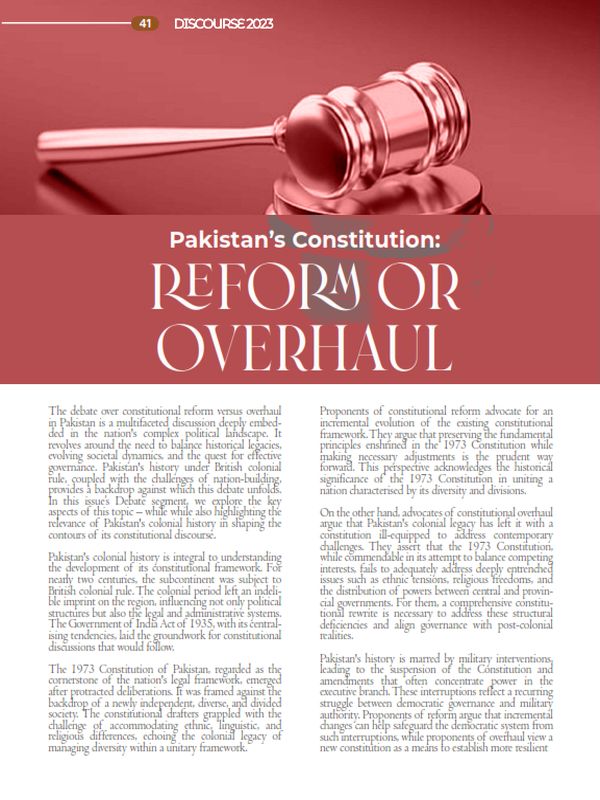Pakistan’s Constitution: Reform or Overhaul?
Introduction
The debate over constitutional reform versus overhaul in Pakistan is a multifaceted discussion deeply embedded in the nation’s complex political landscape. It revolves around the need to balance historical legacies, evolving societal dynamics, and the quest for effective governance. Pakistan’s history under British colonial rule, coupled with the challenges of nation-building, provides a backdrop against which this debate unfolds. In this issue’s Debate segment, we explore the key aspects of this topic – while while also highlighting the relevance of Pakistan’s colonial history in shaping the contours of its constitutional discourse.
Pakistan’s colonial history is integral to understanding the development of its constitutional framework. For nearly two centuries, the subcontinent was subject to British colonial rule. The colonial period left an indelible imprint on the region, influencing not only political structures but also the legal and administrative systems. The Government of India Act of 1935, with its centralising tendencies, laid the groundwork for constitutional discussions that would follow.
The 1973 Constitution of Pakistan, regarded as the cornerstone of the nation’s legal framework, emerged after protracted deliberations. It was framed against the backdrop of a newly independent, diverse, and divided society. The constitutional drafters grappled with the challenge of accommodating ethnic, linguistic, and religious differences, echoing the colonial legacy of managing diversity within a unitary framework.
Proponents of constitutional reform advocate for an incremental evolution of the existing constitutional framework. They argue that preserving the fundamental principles enshrined in the 1973 Constitution while making necessary adjustments is the prudent way forward. This perspective acknowledges the historical significance of the 1973 Constitution in uniting a nation characterised by its diversity and divisions.
On the other hand, advocates of constitutional overhaul argue that Pakistan’s colonial legacy has left it with a constitution ill-equipped to address contemporary challenges. They assert that the 1973 Constitution, while commendable in its attempt to balance competing interests, fails to adequately address deeply entrenched issues such as ethnic tensions, religious freedoms, and the distribution of powers between central and provincial governments. For them, a comprehensive constitutional rewrite is necessary to address these structural deficiencies and align governance with post-colonial realities.
Pakistan’s history is marred by military interventions, leading to the suspension of the Constitution and amendments that often concentrate power in the executive branch. These interruptions reflect a recurring struggle between democratic governance and military authority. Proponents of reform argue that incremental changes can help safeguard the democratic system from such interruptions, while proponents of overhaul view a new constitution as a means to establish more resilient democratic institutions capable of withstanding military interventions.
The constitutional debate in Pakistan also intersects with questions of religious identity and the role of Islam in the state. The 1973 Constitution designates Pakistan as an Islamic republic and incorporates Islamic principles into its legal framework. However, interpretations and implementations of these principles have been contentious, with some advocating for a stricter Islamic legal system, while others emphasise a more inclusive and rights-based approach that appreciate the heterogeneity of Pakistan.
The debate between constitutional reform and overhaul in Pakistan is deeply embedded in its historical context, which includes the colonial legacy. It is a multifaceted dialogue that must balance the preservation of the 1973 Constitution’s foundational principles with the need to address contemporary socio-political complexities. This debate carries significant implications for the trajectory of Pakistan’s democracy, its relationship with its colonial past, and the shape of its future governance. While acknowledging the historical backdrop, Pakistan faces the enduring challenge of forging a constitutional path that aligns with its evolving realities.




